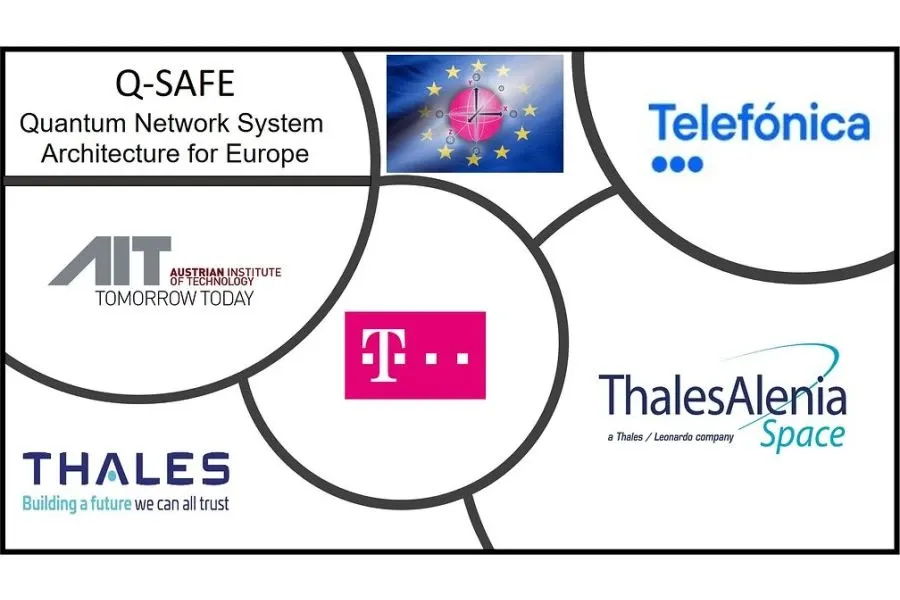CES 2026: Qualcomm Bolsters IoT, Automotive, and Robotics Solutions
Qualcomm unveiled several product updates alongside the launches of new products ahead of the official opening of CES 2026.

After European Commission selected the QSAFE (Quantum Network System Architecture for Europe) consortium to design the European Quantum Communication Infrastructure last April, the interim results have just been delivered. The scope of these results includes the initial technical design, security analyses, initial network dimensioning and lays the foundation for future implementation of the EuroQCI network.
For the secure encryption of sensitive information, the keys must be shared securely enough among the communication partners. Tried-and-tested encryption methods such as RSA (Rivest, Shamir, Adleman) or DH (Diffie-Hellman) will no longer remain secure against quantum computer attacks. This poses a threat to all modern communications and makes the switch to quantum keys essential. Quantum-key technology is based on physical laws of nature that signal unavoidably a potential eavesdropper. Critical infrastructures, confidential private or government information will be protected by quantum keys against attacks and criminal intentions.
The QSAFE consortium led by Deutsche Telekom gathers European partners with a 20-year background in quantum communications for European quantum infrastructure: the AIT Austrian Institute of Technology, Thales, Thales Alenia Space, and Telefónica Investigación y Desarrollo. Associate partners from Academia and highly specialized companies are additionally involved in the project. The study, conducted over fifteen months, follows the ‘security-by-design’ approach and elaborates the basis for the deployment of a European quantum infrastructure considering fiber-based terrestrial as well as satellite-based components. It is the follow-up of a first feasibility phase conducted in 2020, with the same consortium led by Thales at that time.
The study is part of the European Union’s efforts to advance the development of independent and secure quantum communication technologies. End of July 2021, Ireland was the last of the 27 EU Member States to sign the EuroQCI declaration, which is a commitment that the Member States, the European Commission, and the European Space Agency together plan to jointly deploy a secure quantum communication infrastructure.
In April 2021, the European Commission initiated two independent studies, including the one led by the QSAFE consortium, to define the architecture of a EuroQCI. The studies center around the production of quantum-secured keys (Quantum Key Distribution, QKD). The scope is to design a network to deliver keys between different endpoints, where the keys are used for encryption and decryption of classified data, in a way that a potential spy is always detected. The first users will be the European Union, the EU Member States, and additional government-related agencies.
The study will serve the European Commission as a basis for the next steps on the journey to establishing a European quantum communication infrastructure. The project benefits from the diverse experiences of its partners and their long-term involvement in the field of quantum technologies. EuroQCI is essentially a communication network. As such, Deutsche Telekom and Telefónica bring in their fundamental know-how to plan, build, and run a network. In the context of European research activities, both companies have already installed quantum testbeds in Madrid and Berlin and are investigating the interaction between quantum technology and established network equipment.
As one of the leading international applied research institutions with special competencies in the field of QKD technologies, the AIT Austrian Institute of Technology makes important contributions to quantum technology development and implementation of pilot experiments as well as testbeds in Europe. Thales is a global leader in complex, critical security systems for defense, transport, aerospace, and critical infrastructures. The company is contributing to the project by sharing its expertise in cybersecurity and cryptography. Thales Alenia Space is the worldwide leader in telecom satellite constellations and covers aspects of satellite-based QKD.
The QSAFE consortium closely collaborates with certain national government representatives. As such, EuroQCI aligns with national and European security policies. The combination of large European network operators, system integrators, network suppliers for optical communication networks and space components as well as top experts from universities and research institutes forms the ideal framework to design the optimal European Quantum Key Distribution network.